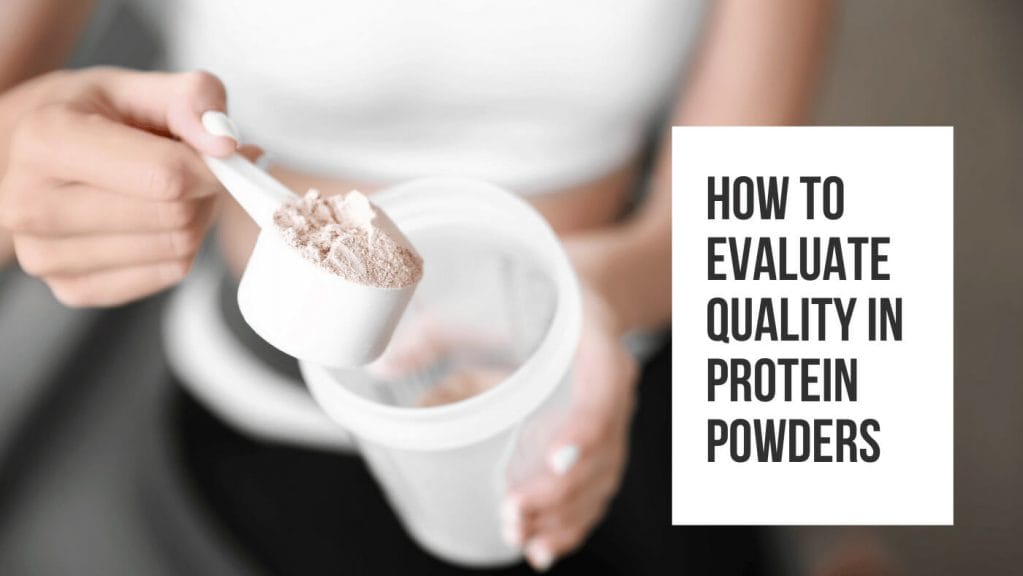Protein powders have become a staple in the diets of athletes, fitness enthusiasts, and health-conscious individuals seeking to meet their protein needs conveniently. However, with the abundance of protein powder options on the market, determining the quality of a product can be challenging. In this blog post, we will discuss how to evaluate the quality of protein powders, so that you make an informed choice that aligns with your dietary and fitness goals.
1. Protein Source
The first step in evaluating a protein powder is to examine its protein source. High-quality protein powders typically derive their protein from sources like whey, casein, egg, or plant-based options like pea, rice, hemp, or soy. It’s essential to choose a protein source that aligns with your dietary preferences and any allergies or sensitivities you may have.
2. Protein Concentration
Look for protein powders with a high protein concentration. Protein concentration is often expressed as a percentage of the total weight of the product. For instance, a high-quality whey protein isolate may contain 90% or more protein by weight. Avoid products with lower protein concentrations, as they may contain excess fillers or additives.
3. Amino Acid Profile
Consider the amino acid profile of the protein powder. Amino acids are the building blocks of protein, and a complete amino acid profile includes all essential amino acids. Whey and egg white protein are examples of protein sources with complete amino acid profiles. Plant-based proteins may lack certain essential amino acids, so combining different sources can help achieve completeness.
4. Ingredient List
Carefully review the ingredient list of the protein powder. High-quality products should have a concise ingredient list that includes the protein source and minimal additional ingredients. Avoid protein powders with excessive additives, artificial flavors, sweeteners, or preservatives.
5. Sweeteners
Pay attention to the type of sweeteners used in the protein powder. Opt for products with natural sweeteners like stevia or monk fruit extract or those with no added sugars. Avoid protein powders with excessive amounts of added sugars or artificial sweeteners, as they can contribute to unwanted health effects.
6. Additives and Fillers
High-quality protein powders should be free of unnecessary additives and fillers. Look out for ingredients like maltodextrin, dextrins, or other fillers that dilute the protein content. These can reduce the overall quality and nutritional value of the product.
7. Third-Party Testing and Certifications
Reputable protein powder brands often undergo third-party testing for quality and purity. Look for products that carry certifications from organizations like NSF International, Informed-Choice, or the United States Pharmacopeia (USP). These certifications provide assurance that the product meets specific quality and safety standards.
8. Allergen Labeling
If you have food allergies or sensitivities, carefully check the allergen labeling on the protein powder packaging. Many products will explicitly state whether they contain common allergens like milk, soy, nuts, or gluten. Choose a protein powder that aligns with your dietary restrictions to avoid adverse reactions.
9. Manufacturing Practices
Consider the manufacturer’s reputation and adherence to good manufacturing practices (GMP). Brands that follow GMP guidelines ensure that their products are produced consistently, meet quality standards, and undergo rigorous testing for purity and safety.
10. Price vs. Value
While price can be an indicator of quality, it’s essential to strike a balance between affordability and value. Some high-quality protein powders are competitively priced, while others may be more expensive due to specific features like organic sourcing or additional certifications. Evaluate the overall value, taking into account protein concentration, ingredient quality, and any added benefits.
11. Flavor and Texture
Taste and texture are subjective factors, but they can impact your overall satisfaction with a protein powder. Read reviews and consider trying sample sizes or smaller containers before committing to a larger purchase to find a flavor and texture that you enjoy.
Evaluating the quality of protein powders involves careful consideration of the protein source, protein concentration, amino acid profile, ingredient list, sweeteners, additives, certifications, allergen labeling, manufacturing practices, price, and personal preferences. By following these guidelines, you can make an informed choice and select a protein powder that supports your nutritional goals, dietary requirements, and overall well-being. Remember that individual preferences vary, so it’s essential to find a protein powder that suits your taste and lifestyle while delivering the nutritional benefits you seek.

